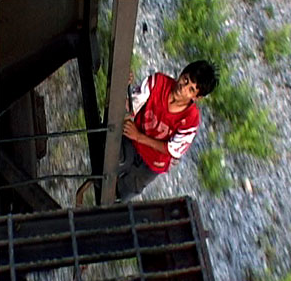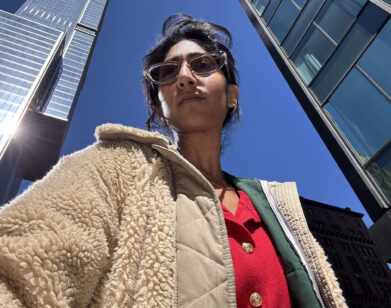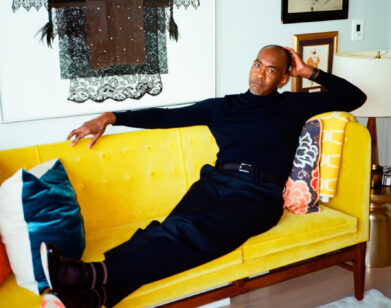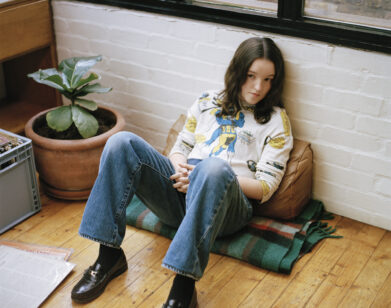Playing With Fire

Rebecca’s Cammisa’s documentary, Which Way Home (premiering tonight on HBO) sheds light on a largely undocumented subset of Mexican and Central American migrant workers: unaccompanied children. Traveling mostly on the tops of freight trains–the kids call their mode of transport “the Beast”–Camissa’s subjects make their way through a series of rural villages, shelters, and detention centers. Determined, brave, and oftentimes shockingly naive about the obstacles they intend to face, the young migrants hurtle toward their vague goal of “a better life” in the United States. Filming on the project began in 2004, though funding troubles–eventually solved through a Sundance grant, a Fulbright scholarship, and funding from John Malkovich’s Mr. Mudd production company and HBO–meant that the project was started and stopped several times. Below, a conversation with Camissa about her experiences shooting the movie.
CB: The environment in which Which Way Home was filmed was an unpredictable one. Did you feel safe?
RC: Not necessarily. You’ve gone into a world where there’s lot violence and a lot of nasty things occur. You’re going in there with cameras and you’re dealing with people who may not be open to being filmed, or even with having a camera near them. You’re also dealing with the danger of the train our lives were threatened a couple of times.
CB: By whom?
RC: People were involved in smuggling, one guy who was a member of a gang. If people didn’t particularly like [the cameras], or they were concerned, their way of handling it was just to threaten us…I must say, that happened very infrequently. Most of our experience was people were very welcoming and open to talking to us.
CB: How did you approach the children?
RC: We would meet them, see them, talk to them. Some were interested in talking initially and then became too scared. There were adults around, so if we were talking–particularly to the children–other adults would come closer to see what we had to say. They would throw out questions and we would answer them. We told people what we were doing and people began to trust us.
CB: What was the reaction of the children’s parents to their participation in the film?
[Cammisa’s crew contacted their subjects’ families for permission to tape them.]
They were fine with it. I think their first reaction was, “Will you take care of our kids?” and we had to explain that we’re not responsible for them. We cannot take them anywhere, we can’t feed them, we can’t pay for them–we’re just there to document the plight of the migrant and that children are doing this, as well.
CB: Did you feel the children had a realistic idea of the dangers they were facing? Did you feel compelled to warn them?
RC: We did our best to make them aware of what the realities were. Every time they wanted to get on the train, we said, “This is too dangerous, you could die…” We gave them the laundry list of all the potential things that could happen to them and we reminded them that, if they wanted to go home, we could help them get home for sure. They turned to us and said, “Oh, if it’s so dangerous, then give us bus fair and we’ll take a bus.” They turned it on us and, I guess, rightly so. You know, “Stop telling us what to do. Stop scaring us unless you can give us an alternative.” Their point was well taken: “Thanks for the warning, but we have no other way of doing this.”
CB: Did the parents seem to understand the difficulty of the journey their children were making?
RC: I think of the parents we talked to some had an idea of what could go wrong, but they felt they didn’t have any choice. One mother said, “Listen, I could never cross that border. I tried it once it was horrible.” And then my question was, “How could you send your child?” and she said, “I don’t want him to fall into being a gang member here. My family there, they’ll put him through school and he’ll have a better life.” And I asked her, “How could you have a smuggler take him when he could be hurt or harmed in the desert?” Her response was, “We have a neighbor or a friend along who promised he’d be okay and look after him.” Some parents may be aware or not, but if there’s a trusted friend traveling with them, then they feel better about it. They’re not bad parents. I think maybe they’re not educated about it, they’re desperate themselves, and the United States is a huge lure.
CB: Having documented this world, do you feel there’s a way to improve it?
RC: I don’t hold to the attitude that there’s one or two policies that will change everything and everything will magically turn out for the best. One thing I learned is, I always thought these people really want to come to America, that they really want to just be here. And most people we interviewed, they’re coming only because they’ve no other choice. There’s nothing there for them in their country, the government isn’t helping them, and they can’t sustain their lives. They’re doing it because they feel they must. If people are secure and succeeding in their own countries, that’s less people coming right there. And, then, let’s say that won’t happen, that they’re going to continue coming. Then, I think, the US needs to be very practical. We need people to work here, in our country–they’re an important part of the workforce. Therefore, let’s create some sort of functional, seasonal work permit. They can come, then they can go back to their families. That way, there’s not this problem of family reunification–people aren’t separated from their children for years and years.
Which Way Home premieres tonight on HBO at 9:00 PM. Those interested in learning more about the project or in donating to the subjects and their families can visit www.whichwayhome.net.






